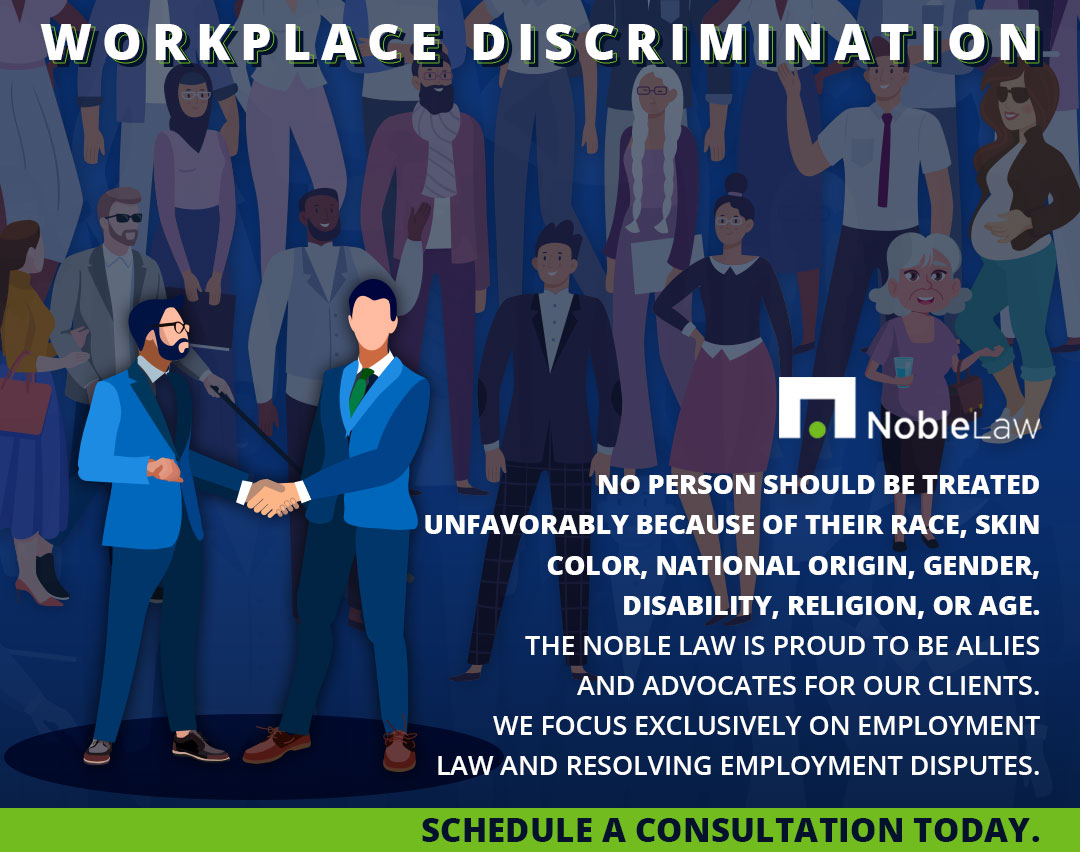



Wage Discrimination
You have the right to be paid fairly and equally for your work regardless of sex, race, disability, nation of origin, religion, or age. However, wage discrimination takes place in workplaces across the country.
Our employment law firm has experience helping employees negotiate fair and equitable employment contracts. Often, the terms of an employment contract are negotiable, and you don’t have to “take it or leave it” in order to secure your position in the company. Wage discrimination could cost you thousands of dollars over the course of a single year, and that figure multiplies for each year you work at the company.
Wage discrimination violates your rights, and our employment attorneys are here to defend them. Many women, people of color, and differently-abled people are familiar with pay discrimination. You don’t have to accept wage discrimination as just part of having a job — you can take legal action. Employment law exists to protect workers, and The Noble Law employment attorneys in North Carolina are here to advocate for you.
While pay discrimination can be hard to prove, we have the employment law experience to help you understand your options and defend your compensation. Contact our employment law firm in North Carolina or South Carolina to get started.
Pregnancy Discrimination
Becoming pregnant can be a wonderful and exciting time in your life, however, the workplace is not always supportive of pregnant women. There may be several potential pitfalls that you’ll need to manage in order to keep your career on track. Know that there are employment laws out there to protect you.
Pregnancy discrimination involves treating a job applicant or employee unfavorably because of pregnancy, childbirth, or a medical condition related to pregnancy or childbirth. The Pregnancy Discrimination Act (PDA) forbids pregnancy discrimination and outlines the rights of pregnant women in the workplace the supports their employer must provide.
Under the PDA, an employer cannot refuse to hire a pregnant woman on the basis of her being pregnant. If you are unable to perform your job duties because of your pregnancy, your employer must treat you the same way they would treat someone with a temporary disability. Pregnant employees must also be allowed to work for as long as they are able to perform their jobs and not forced into taking leave simply because they are pregnant.
You are also protected from losing your health insurance because of pregnancy-related conditions. If you have employer-provided health insurance, your employer must cover expenses for pregnancy-related conditions in the same way that they would any other medical condition. Learn more about pregnancy discrimination and the ways it can show up in the workplace here on our pregnancy discrimination page.
Knowing your rights under employment law is the first step to a more equitable workplace for people who are pregnant. Here at The Noble Law, we provide representation and advocate for marginalized employees in the states of North Carolina and South Carolina. If you believe you have experienced pregnancy discrimination, contact our employment law firm today.
Pregnancy Discrimination Video Resources
Learn more about pregnancy discrimination and what your legal options are. These videos provide a general overview of employment law. If you’re in need of legal counsel, please schedule a consultation with our employment law attorneys in either North Carolina or South Carolina.
Pregnancy Discrimination
Race Discrimination
Discrimination based on race involves treating an applicant or employee differently because of their race or any other personal characteristics associated with race, such as cultural dress or hair texture. Title VII of the Civil Rights Act of 1964 protects individuals against this type of workplace discrimination. The law forbids discrimination in any aspect of employment, including hiring, advancement, compensation, harassment, and retaliation.
Examples of forbidden racial discrimination in the workplace include firing or disciplining an employee because of their race, paying an employee less on account of their race, and failing to provide benefits or promotions on account of race. Each instance of racial discrimination in the workplace is different, though, and your situation may not fit neatly into a single category. That’s why it’s important to speak with an employment attorney, like those at The Noble Law, to better understand your situation and legal options.
Equal employment opportunity cannot be denied because of marriage or association with an individual of a different race or membership with ethnic-based organizations. It is also illegal to discriminate based on a condition that predominantly affects one race, such as sickle cell anemia, which occurs predominantly in African-Americans.
Too many cases of race discrimination fall through the cracks. Discrimination at work is a problem, and it needs to be addressed. Our employment law attorneys are committed to protecting and advocating for people experiencing race discrimination. We stand ready to defend employees facing race discrimination in the workplace.
You have the right to be treated equality, no matter your race or the color of your skin. If you have experienced workplace discrimination in North Carolina or South Carolina and would like to consult with a Noble Law employment law attorney, contact us today.
Race Discrimination Video Resources
Learn more about race discrimination in the workplace and what your legal options are. These videos provide a general overview of employment law. If you’re in need of legal counsel, please schedule a consultation with our employment law attorneys in either North Carolina or South Carolina.
Race Discrimination Video Resources
Learn more about race discrimination in the workplace and what your legal options are. These videos provide a general overview of employment law. If you’re in need of legal counsel, please connect with our employment law attorneys in either North Carolina or South Carolina.
Should I Quit?
Choosing A Law Firm
Religious Discrimination
Religious discrimination can take many different forms. It can include, but is not limited to, being denied work or promotion, denied an accommodation at work, or treated unfavorably because of religious beliefs. The law protects both people who belong to organized religions such as Judaism, Islam, Buddhism, and Christianity, and those who have other sincerely held religious, ethical, or moral beliefs.
An employer must also reasonably accommodate an employee’s religious beliefs or practices, including dress and grooming practices. This applies to schedule changes or leaves for prayer and religious observations. It also applies to things like wearing head coverings or keeping a beard or dreadlocks.
If you are being discriminated against or harassed in your workplace because of your religious beliefs, our employment law firm can help. Schedule an appointment with a Noble Law employment law attorney in North Carolina or South Carolina today.
Religious Discrimination Video Resources
If you decide to persue a religious discrimination case, your employment-law claim must go through an administrative review process before you can go to court. This means you must first file with the Equal Employment Opportunity Commission, or EEOC. Watch these videos to learn more about how this process works.
These videos provide a general overview of employment law. If you’re in need of legal counsel, please schedule a consultation with our employment law attorneys in either North Carolina or South Carolina.
Making an EEOC Claim
What happens after I get an EEOC Right To Sue Letter?
Caregiver Discrimination
Most workers understand that discrimination based on traits like sex or age is illegal. Fewer people realize that unfair treatment based on one’s role as a caregiver is also impermissible. While caregiver discrimination is real and illegal, it is not spelled out as clearly in the law as other types of prohibited discrimination, so it is important to discuss your situation with an employment discrimination lawyer.
You may have a lot of questions about whether your workplace treatment was justified or crosses the line into prohibited discrimination. At The Noble Law, we listen. We hear you. We understand.
National Origin Discrimination
Individuals are entitled to equal access to employment opportunities, no matter what their nation of origin. Title VII of the Civil Rights Act of 1963 forbids discrimination based upon an individual’s birthplace, ancestry, culture, linguistic characteristics, or accents. The law also applies to individuals married or associated to groups of a particular national origin.
If you are being harassed by coworkers for wearing a hijab or are paid less because you are Mexican or if you are not hired because of your Chinese accent, you may be a victim of discrimination based on national origin. Discrimination can take many forms, and can also occur when the victim and the person inflicting the discrimination are of the same national origin.
The Noble Law has extensive experience in the area of employment law, and we are here to help you understand your legal options. If you are experiencing national origin discrimination, schedule a consultation with one of our employment law attorneys.
National Origin Discrimination Video Resources
Learn more about national origin discrimination in the workplace and what your legal options are. These videos provide a general overview of employment law. If you’re in need of legal counsel, please connect with our employment law attorneys in either North Carolina or South Carolina.
What To Expect From A Consultation
What is a Hostile Work Environment?
Disability Discrimination
The Disabilities Act and the Rehabilitation Act forbid discrimination on the basis or a mental or physical disability. Disability discrimination also occurs when an employer treats an applicant or employee less favorably because they have a history of disability, such as cancer that is in remission. The law forbids discrimination in any aspect of employment, including hiring, firing, pay, promotions, training, and any other condition of employment.
Your employer is required to provide reasonable accommodations to employees with disabilities. These accommodations can include making a workplace more accessible for wheelchairs or providing an interpreter for someone who is hearing impaired. If you are experiencing disability discrimination, our employment law firm can help you understand your legal rights and options.
Disability Discrimination Resources
Here are a few resources you can use to understand more about disability discrimination. These are general employment law resources. If you’d like to discuss your personal situation with an experienced employment law attorney, schedule a consultation in South Carolina or North Carolina today.
LGBTQ Discrimination
The LGBTQ discrimination lawyers at The Noble Law are aggressively pursuing legal action against employers, landlords, and organizations that use a person’s sexual orientation or gender identity as a reason to deny services and basic human rights. We believe that everyone should be treated equally and fairly and that employers and organizations should be held accountable when they discriminate against members of the LGBTQ community. If you were discriminated against because of your gender or sexual identity, the law gives you the right to fight back. Call our team today to explore your legal options.
What Kinds of Conduct Qualify as Actionable LGBTQ Discrimination?
Conduct that rises to the level of sexual identity and gender discrimination can fall in a range from subtle to blatant and can include:
- Being passed over for promotions or desirable work assignments
- Employment termination
- Comments from coworkers and managers relating to an employee’s appearance or habits
- Inappropriate touching or gestures
- Threats of sexual assault or rape
- Rejections when applying for rentals or loans for housing
Gender Discrimination
Despite major progress in recent years, gender discrimination is still prevalent in the American workplace. Gender and sex discrimination, covered in Title VII of the 1964 Civil Rights Act, includes all aspects of employment, such as recruiting, hiring, placement, promotion, advancement opportunities, working conditions, on-the-job training, apprenticeships, compensation, workplace benefits, layoffs, and other conditions of employment.
Definition of Sex and Gender Discrimination
The U.S. Equal Employment Opportunity Commission defines gender-based discrimination as “treating someone unfavorably because of that person’s sex.” Discrimination against an applicant or employee because of gender identity or sexual orientation is unlawful and merits further investigation by the employment law lawyers at The Noble Law.
Title VII applies to all state and local governments, educational facilities, and private employers with 15 or more employees. This federal law also covers labor organizations, in addition to public and private employment agencies.
Age Discrimination
Workplace age discrimination is common even when it is illegal. State and federal laws often provide recourse for those who are unfairly discriminated against based on age. However, protections for employees and job applicants vary by jurisdiction, and discrimination can be tricky to prove in court.
Workplace conflicts, including those involving discrimination, are often highly emotional. Having a knowledgeable lawyer by your side can help you make informed, rational choices. The workplace discrimination lawyers at The Noble Law have extensive experience helping employees in North Carolina and South Carolina assert their workplace rights. We take a look at the big picture while keeping our clients’ needs in focus.


Signs You May Be Facing Workplace Discrimination
Workplace discrimination is not always straightforward, but there are some telltale signs to watch out for. If you are treated differently than your coworkers in similar roles, it could be a red flag. Frequent, unwarranted criticism or disciplinary actions might also signal discrimination. Feeling isolated or excluded from meetings, projects, or social activities without a valid reason can be another clue.
Listen for disparaging remarks about your race, gender, age, disability, or other protected characteristics—these are clear indicators of a discriminatory environment. Additionally, unfair work conditions, such as unequal pay or being passed over for promotions, often point to discrimination.
What to Do If You’re Facing Workplace Discrimination
Many employees hesitate to address poor behavior in the workplace because they are worried about keeping their jobs. Although this concern is valid, it is important to address workplace discrimination to protect both your well-being and that of others.
If you are an employee, and you feel you are being discriminated against by your employer or coworkers, there are certain steps you should take to protect yourself. You should:
Document the Discrimination
Try to create a timeline of what happened by keeping a detailed log of each incident. Note the dates, times, locations, people involved, and any witnesses. Save any emails, messages, or documents that could support your case.
Make a Formal Written Complaint
Make a formal complaint by writing a letter or filling out a complaint form provided by your company’s HR department. This action shows your commitment to addressing discrimination, while also ensuring your concerns are documented officially. It also safeguards your right to take legal action later by notifying the company and giving them a chance to fix the issue.
File a Charge with the EEOC or State Agency
In most cases, before filing a lawsuit, you must first file a charge of discrimination with the Equal Employment Opportunity Commission (EEOC) within 180 days of the discriminatory act. This charge initiates an investigation into your allegations. But before doing so, reach out to an attorney. They can assist in drafting and filing your complaint with the EEOC on your behalf.
Speak to an Attorney
Consider talking to a workplace discrimination attorney about your situation. They can help you understand the strength of your case and what outcomes you might expect.
Addressing workplace discrimination requires courage and determination. By taking these steps and seeking appropriate support, you empower yourself to confront discrimination and advocate for a workplace environment that is fair, respectful, and inclusive.
Benefits of Hiring a Workplace Discrimination Attorney
Partnering with a specialized discrimination attorney provides you with the advantage of their extensive experience and knowledge tailored to handling cases like yours. At our firm, we bring expertise and a deep understanding of discrimination laws and how to navigate them. An attorney at The Noble Law can act as your advocate, ensuring your case is presented clearly and powerfully.
Retaliation from employers is a real concern for many who file discrimination complaints, and may give rise to a separate legal claim. Our attorneys can advise you on your rights and address any retaliatory behavior promptly and effectively. Moreover, our discrimination attorneys are well-versed in the tactics often used by employers or opposing parties. We can anticipate these moves and advise you on how to counter them.
Without legal representation, navigating these complexities and standing up to experienced opposition can be significantly more difficult, potentially jeopardizing the outcome of your case. We understand these cases can be emotionally challenging. The Noble Law is here to help reduce the stress of handling the situation on your own, so you can focus on your well-being and career.
How Our Workplace Discrimination Attorneys Can Help
At The Noble Law, our workplace discrimination attorneys are here to assist you in every aspect of your case, ensuring everything is done correctly. Our attorneys are skilled negotiators who can work towards a settlement or, if necessary, represent you in court.
Our goal is to secure fair compensation for the hardships you have endured due to workplace discrimination, including damages such as lost wages, emotional distress, and punitive damages, where applicable.
Filing a workplace discrimination claim can feel intimidating, but remember, The Noble Law is on your side. Those who discriminate against you must be held accountable for their actions.


Employment Discrimination Lawyer Cost
An employment discrimination lawyer might provide services on an hourly or flat fee-for-service basis, or alternatively with a contingency fee arrangement. Under a contingency fee agreement, the lawyer will earn his or her fees as a percentage of the damages recovered by the employee. That fee might be approximately 30-35% if the lawsuit settles before trial and up to approximately 40% if it proceeds to trial. Certain discrimination statutes also include provisions that allow the employee to collect legal fees from the employer who discriminated against him or her.
Employees who are experiencing workplace discrimination might be reluctant to sue their employers for any number of reasons. Concerns over how much an employment lawyer costs should never be one of those reasons. Many employment discrimination lawyers will make fee arrangements with an aggrieved employee that will substantially reduce or eliminate the employee’s direct legal fees.
The employment discrimination attorneys at Noble Law represent employees who have been mistreated due to their race, color, religious beliefs, gender identity, national origin, disability, or status as a protected veteran. We welcome questions about how much an employment discrimination lawyer costs, and we promise full transparency regarding our fees and services.
Learn More
The Noble Law is committed to educating our communities in both South Carolina and North Carolina about employment law. We believe that one of the first steps to a more equitable workplace is for employees to understand their rights. And we also believe that part of our job as employment lawyers is to share what we know with others. Explore our resources, including more employment law videos, and keep up with our employment law firm news by following Noble Notes.
Along with representing clients in the area of workplace discrimination, we also provide legal counsel to clients with claims of workplace harassment, executive compensation disputes, retaliation and whistleblower, and pay, overtime, and leave cases. Learn more about our law firm on our Practice Area page and if you’re interested in speaking with one of our employment lawyers, contact us today.














